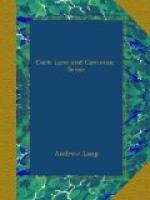As usual among the Presbyterians a minister might have abnormal accomplishments, work miracles of healing, see and converse with the devil, shine in a refulgence of ‘odic’ light, or be second-sighted. But, if a layman encroached on these privileges, he was in danger of the tar-barrel, and was prosecuted. On the day of the battle of Bothwell Brig, Mr. Cameron, minister of Lochend, in remote Kintyre, had a clairvoyant view of the fight. ’I see them (the Whigs) flying as clearly as I see the wall,’ and, as near as could be calculated, the Covenanters ran at that very moment. {233a} How Mr. Cameron came to be thought a saint, while Jonka Dyneis was burned as a sinner, for precisely similar experiences, is a question hard to answer. But Joan of Arc, the saviour of France, was burned for hearing voices, while St. Joseph of Cupertino, in spite of his flights in the air, was canonised. Minister or medium, saint or sorcerer, it was all a question of the point of view. As to Cameron’s and Jonka’s visions of distant contemporary events, they correspond to what is told of Apollonius of Tyana, that, at Ephesus, he saw and applauded the murder of Domitian at Rome; that one Cornelius, in Padua, saw Caesar triumph at Pharsalia; that a maniac in Gascony beheld Coligny murdered in Paris. {233b} In the whole belief there is nothing peculiarly Scotch or Celtic, and Wodrow gives examples among the Dutch.
Second Sight, in the days of James VI. had been a burning matter. After the Restoration, a habit of jesting at everything of the kind came in, on one hand; on the other, a desire to investigate and probe the stories of Scotch clairvoyance. Many fellows of the Royal Society, and learned men, like Robert Boyle, Henry More, Glanvill, Pepys, Aubrey, and others, wrote eagerly to correspondents in the Highlands, while Sacheverell and Waldron discussed the topic as regarded the Isle of Man. Then came special writers on the theme, as Aubrey, Kirk, Frazer, Martin, De Foe (who compiled a catch-penny treatise on Duncan Campbell, a Highland fortune-teller in London), Theophilus Insulanus (who was urged to his task by Sir Richard Steele), Wodrow, a great ghost-hunter: and so we reach Dr. Johnson, who was ‘willing to be convinced,’ but was not under conviction. In answer to queries circulated for Aubrey, he learned that ‘the godly’ have not the faculty, but ‘the virtuous’ may have it. But Wodrow’s saint who saw Bothwell Brig, and another very savoury Christian who saw Dundee slain at Killiecrankie, may surely be counted among ’the godly’. There was difference of opinion as to the hereditary character of the complaint. A correspondent of Aubrey’s vouches for a second-sighted man who babbled too much ‘about the phairie,’ and ’was suddenly removed to the farther end of the house, and was there almost strangled’. {234} This implies that spirits or ‘Phairies’ lifted him, as they did to a seer spoken of by Kirk, and do to the tribal medicine-men of the Australians, and of course, to ‘mediums’.




